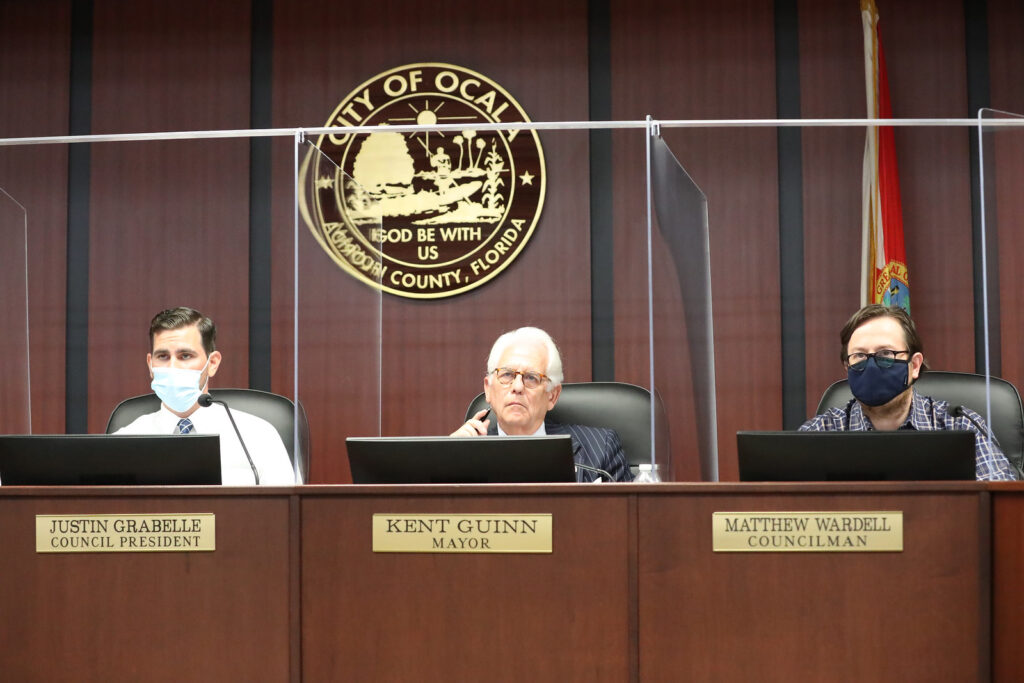City considers term limits, no salary cap

Council President Justin Grabelle, Ocala Mayor Kent Guinn and Councilman Matt Wardell, left to right, listen during an Ocala City Council meeting at Ocala City Hall in Ocala, Fla. on Tuesday, Dec. 15, 2020. [Bruce Ackerman/Ocala Gazette] 2020.
Ocala residents may soon get an opportunity to vote on changes to the city charter, including imposing term limits and removing salary caps for city council members and the mayor.
On Tuesday, the first step in the process will introduce the proposed six amendments, as well as the language to appear on the ballot during city elections on Sept. 21. On April 20, after public comments, the council will consider each amendment separately. Those amendments passed, will go on the ballot.
Voters must approve each of the six amendments by a simple majority of 50% plus one.
Half of the amendments under consideration are directly related to issues the council faced in the last 17 months, including the timing of special and run-off elections, when council member’s terms end and begin and shortening the window for mayoral vetoes of emergency ordinances.
Here’s a look at the six prospective charter changes, which will go through first readings at Tuesday night’s council meeting:
Timing of Special and Run-Off Elections
The proposed change would make the timing of special and run-off election more flexible to allow for transit time of certain ballots.
Currently, the charter requires that special elections be held less than 60 days following a vacancy. Meanwhile, run-off elections are to be held on the third Tuesday of November following a September election.
The amended requirements would allow those elections to be held “as soon as reasonably practicable and in compliance with state and federal law.”
The issue came up after Tyrone Oliver was elected to the council in November 2019. Later, he was found ineligible to take the seat because he was a convicted felon and did not have his rights restored. A series of special elections eventually led to Councilman Ire Bethea taking the District 2 seat. But during the process, the charter’s provisions conflicted with the time frame allowed for military personnel serving abroad to return their ballots.
Term Beginning and End for Council Members and Mayor
The Oliver election also revealed the need to clarify when council and mayoral terms begin and end.
The charter is fuzzy on the issue.
An attorney for Oliver noted the charter states the new council takes over on the first Tuesday in December in an election year. The phrase implies the former council is out of power at midnight on the first Tuesday.
By that argument, the council that decided not to seat Oliver on that first Tuesday was technically out of power and unable to make the decision. The question led to a second council vote to avoid a legal challenge.
The change provides that the terms for council members and the mayor officially start when they are “adjudged, elected and qualified by City Council and upon swearing an oath of office.”
Terms would officially end at the commencement of a successor’s term.
Mayoral Veto of Emergency Ordinances
The city is proposing that the city mayor’s timeline to veto an emergency ordinance be shortened from 10 days to 48 hours from the council’s adoption of such an ordinance.
The proposed change comes after Mayor Kent Guinn waited six days to veto the city’s emergency mask mandate, which the council passed on Aug. 4.
The council later overturned the mayor veto by a four-fifths vote on Aug. 12.
Under the proposed rule, if the mayor fails to file his veto within the 48-hour-mark, the emergency ordinance would be effective immediately.
The proposed change does not affect the mayor’s timeline to veto other ordinances. That would remain at 10 days.
Term Limits for Council Members and Mayor
The City of Ocala’s code of ordinances currently has no term limits in place for its mayor and council members. The proposed change would cap officials at eight consecutive years of service to the city.
“No person shall be permitted to appear on a ballot for re-election to the office of city council member or mayor if, by the end of the current term of office, the person will have serves or, but for resignation, would have served, in that office for eight consecutive years,” the proposed amendment reads.
While the change would take effect moving forward, the terms are not counted retroactively.
Guinn has held the office of mayor for ten years and plans to run for his sixth consecutive term in September. District 1 Councilman Brent Malever has also been at his post since 2013 and is approaching the eight-year mark. Malever announced he will also seek re-election in September.
Removing Maximum Salary for Council Members and Mayor
Salary limits for the council and the mayor would disappear under a proposed amendment.
Currently, council members earn a maximum monthly salary of $200, while the council president makes $250 a month. Meanwhile, the mayor’s salary is capped at $550 a month.
In its place, salaries would be decided at the discretion of the council with no ceiling.
Eliminating Gender-Specific References
The city is proposing the revision of the charter in its entirety to remove gender-specific references to be more gender-neutral.
For instance, “councilman” would be referred to as “council member” and “policeman” would be changed to “police officer.”
Other changes would include referring to officials by their titles instead of references such as “he”, “him” and “his.”
The amendments were proposed after individual meetings between the city attorney and each council member, said Rob Batsel, the city attorney.
The proposed changes were then discussed during a city council workshop and whittled down to the six current proposed amendments. A charter review commission was considered, but the city council decided against that move, Batsel said.





